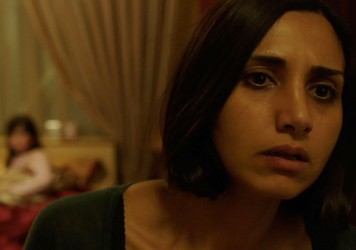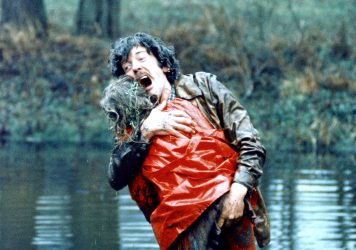Rosamund Pike and Matthew Rhys navigate parental fears in Babak Anvari’s gripping yet shaky psychological thriller.
Dread is a constant in this Babak Anvari directed chamber piece mostly set inside a car on a late night journey. Hallow Road is written by William Gillies and stars Rosamund Pike and Matthew Rhys as parents who are hurriedly rushing to aid their daughter Alice (the voice of Megan McDonnell over the phone) who has been involved in a car accident nearby. Playing out as part psychological chiller and part supernatural horror, it navigates parental fears and family secrets in a sinister liminal space.
The opening scene presents the aftermath of a family encounter in forensic detail. The loud ticking of a clock, a paramedic work-pass idly strewn in the hallway, the incessant beep of a smoke alarm when the battery has run low, and Rhys’ Frank passed out on his desk. Pike’s Maddie answers a call from Alice who is in distress. This is all shot on 16mm film. As soon as the couple jump in their car for a nightmarish drive to rescue their daughter the camera switches to digital.
The human drama works exceptionally well thanks to the talented trio of cast members, but the supernatural elements are so heavily signposted they distract from the emotional weight of the personal demons haunting the couple. Pike’s paramedic has grown distant from her husband and is struggling at work, while Rhys is upset at Alice for her behaviour involving a boyfriend who he doesn’t approve of. Both of them want to do what is best for their daughter but their differing moral responses to her situation create an atmosphere of unease.
Anvari’s nifty camerawork in the car reflects the couple’s state of mind. Tight angles, claustrophobic close-ups and the switching POVs work well to create twitchy, edge-of-your- seat viewing. Technically the editing is a marvel and the sound design is turned up to eleven for bone-crunching intensity. The screenplay too builds mystery surrounding an argument, which is eked out in a taut and credible fashion. Pike and Rhys’s performances are set to panic mode and it’s their fraught dynamic that drives the narrative forward. A resuscitation sequence in particular draws out their desperation in a novel way. There are some clever decisions taken in how the dual dilemma plays out but as soon as the film switches gears into a supernatural fairy-tale, with the couple literally getting lost in the woods, it loses potency.
The elliptical approach of the screenplay is less disorientating than something like Nicolas Roeg’s Don’t Look Now which dealt in similar thematic territory. The allegory is blindingly obvious from the very beginning which scuppers a reveal later on down the road. Formally, the initial set-up recalls Jeremy Lovering’s In Fear or Steven Knight’s Locke and it ends up exploring a comparable breakdown in communication between a family. Gillies’s script asks compelling questions about the lengths parents will go to in order to protect their child but cementing together two genres is a difficult task and it’s one that doesn’t entirely work due to the screenplay’s shaky foundation.
To keep celebrating the craft of film, we have to rely on the support of our members. Join Club LWLies today and receive access to a host of benefits.
Published 15 May 2025
Babak Anvari explores parental anxieties again.
Nicely crafted exercise in tension.
Heavily signposted horror.

This impressive, chilling debut feature brings home-invasion horror to 1980s Tehran.

George MacKay plays a graffiti artist who uncovers a dark secret in Babak Anvari's effective – but distractingly ugly – new thriller.

This ghostly 1973 adaptation of Daphne du Maurier’s short story is a masterclass of staging, acting and editing.